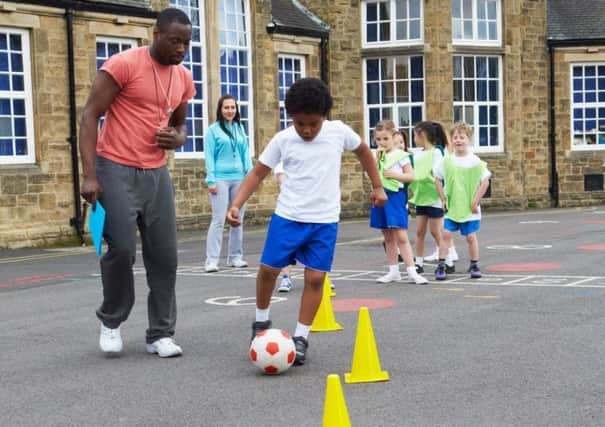Tom Peterkin: Joy of sport is in taking part


Sadly, it would appear that the attainment gap between the rich and the poor is not restricted to the achievements of children in the classroom, it also exists when it comes to their performances on the sports field.
According to research conducted by the BBC documentary The Medal Myth, around nine in ten publicly-funded elite athletes in Scotland went to a fee-paying school or a secondary school in an affluent area.
Advertisement
Hide AdAdvertisement
Hide AdThis depressing statistic comes as little surprise, but should sound an alarm bell for those responsible for sport in the Scottish Government.
For years private schools have made a virtue out of providing a solid sporting education. In days gone by the same could have been said of publicly-funded sector. The BBC research suggests there are still pockets of sporting excellence in the state system, but the overall picture is not a good one.
The fact that children are being denied the opportunity to excel at sport – or even participate in it – through an accident of birth is yet another gloomy indictment of the Scottish education system.
The lack of outdoor sports facilities at schools was publicised by the Labour Party yesterday. According to the data from the national sporting agency SportScotland, 40 per cent of schools do not have any outdoor provision. Correspondence between Scottish Labour and the agency revealed that a total of 1,040 Scottish schools have no outdoor sports facilities including 43 per cent of primaries, 8 per cent of secondaries and 77 per cent of schools with additional support needs.
Despite this lamentable shortage, Scotland is actually on a bit of a high when it comes to sporting achievement at an elite level. Last summer’s Rio Olympics saw Scottish athletes bring home ten medals, a historic high which beat the nation’s previous best of eight medals at the Stockholm Olympics of 1912. The Glasgow Commonwealth Games also saw a glorious summer in 2014 with Scottish athletes recording a record medal tally of 53, the fourth best performance of any country. The icing on this trophy laden cake has been individuals like multiple medallists Sir Chris Hoy and Dame Katherine Grainger and the breath-taking displays of Sir Andy Murray.
Their achievements, however, cannot mask the fact that sport is not for all in Scotland. Tellingly, the startling omission from this roll of honour is our national sport – football. It is years since a Scottish club made any impact in Europe and even longer since our national team qualified for a major championship. Yet this is the game which arouses the most passion from ordinary people and the one which used to be a mass participation sport. Unlike cycling or rowing, which require expensive equipment, it is a sport that only requires a patch of ground, a ball and jumpers for goal posts.
Scotland’s towns and cities no longer produce the world class players that they used to. That must be down to fewer young people participating. Contrast that with another great Scottish team game – rugby. Although the playing base has been largely restricted to the fee-paying schools and two pro teams, the national rugby side is showing signs of a renaissance with the team narrowly failing to make it to the World Cup semi-finals.
Many schools, clubs and youth organisations are making strenuous and hugely commendable efforts to introduce youngsters from the most deprived areas to sport. But, as the BBC’s research and SportScotland data suggested, still too many are missing out.
Advertisement
Hide AdAdvertisement
Hide AdThe Medal Myth looked into the educational backgrounds of 525 elite Scottish athletes and found information about 383 of them. One-fifth (20 per cent) of them went to private schools. A further 70 per cent went to the wealthiest state schools (entitlement to free school meals was used to rank the relative affluence of schools).
As the BBC documentary pointed out, the benefits of participation in sport should not be reduced to a medal-counting exercise. There is so much more to sport than success at the elite level. Not everyone can be Andy Murray, but almost everyone can find enjoyment in sport at their level. It teaches about working as a team, the benefits of hard practice, physical fitness and treating the “two imposters” of triumph and disaster “just the same”. It is also fun. Sport teaches useful life lessons, while the health benefits of taking exercise cannot be ignored by a sickly nation.
It just so happens that the Scottish Parliament has sporting expertise among its ranks, too.
A random selection of sporting parliamentarians includes Conservative Douglas Ross, who is a qualified football referee. His colleague Liz Smith is a former cricket internationalist who is heavily involved in cricket coaching. Alison Johnson of the Greens is a former 800m and 1500m East of Scotland title holder. Liam McArthur of the Lib Dems played for Scottish Universities at football, while Brian Whittle of the Tories was a famous athlete, winning gold in the 400m relay at the European Championships and who has been involved in coaching young people across a range of disciplines and sports.
Whittle is a politician who believes promoting a healthy lifestyle in all sections of the community is priority that should cross party boundaries. He has written a paper What Do We Want the Health of Our Nation to Look Like in 20 Years?, which calls for equality of opportunity.
Whittle believes broader strategies are required to improve children’s physical, mental and academic health – which, he believes, are all linked. His thoughts, and those of other experts, are worth exploring. because bridging the gap between the sporting haves and the have nots is vital to the health of our nation.